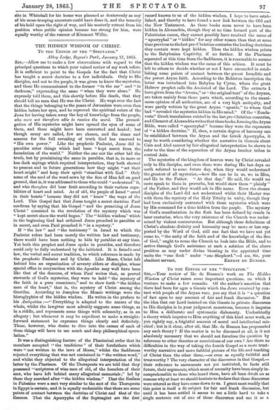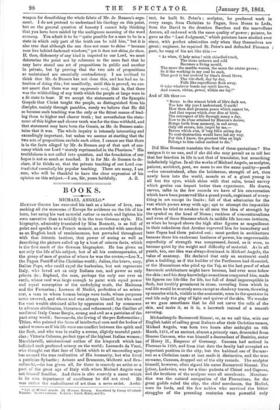To THE EDITOR OF THE " SPECTATOR."
SIR,—Your review of Mr. de Bunsen's work on The Hidden Wisdom of Christ raises some important questions, on which I venture to make a few remarks. Of the author's assertion that there had been for ages a Gnosis which the Jews received by con- tact with people of the Aryan race, you say that it is " a question of fact open to any amount of fair and frank discussion." But the idea that our Lord insisted on this Gnosis in private discourses to His disciples is in your judgment monstrous, because it imputes to Him a deliberate and systematic dishonesty. Undoubtedly a theory which imputes to Him anything of this kind must work, as you rightly say, a frightful amount of moral and intellectual mis- chief; but is it clear, after all, that Mr. de Bunsen has propounded any such theory? If the matter is to be discussed at all, is it not absolutely necessary that we should not foreclose the question by reference to other theories or convictions of our own ? Are there no difficulties in the way of taking the fourth Gospel as a more trust- worthy narrative and more faithful picture of the life and teaching of Christ than the other three,—or even as equally faithful and trustworthy ? The very character of the discourses in that Gospel,— their reference to sacraments not yet instituted, to facts still future, their arguments, which must of necessity have been simply in- comprehensible to those who heard them, have all been dwelt on as reasons why at least we should hesitate to declare that these discourses were uttered as they have come down to us. I grant most readily that this point is itself a fit subject for fair and frank discussion, but until it has been settled it seems to me a little hard to take a single sentence out of one of those discourses and use it as a weapon for demolishing the whole fabric of Mr. de Bunsen's argu- ment. I do not pretend to understand his theology on this point, but on the general question of honesty I cannot help thinking that you have been misled by the ambiguous meaning of the word economy. You admit it to be " quite possible for a man to be in a state in which only part of the truth can be told him," but it is also true that although the sun does not cease to shine " because men live behind darkened windows," yet it does not shine for them. If, then, dishonesty of any kind is imputed to our Lord, we must determine the point not by reference to the mere fact that he may have stated one set of propositions in public and another in private, but by proving that the two sets of propositions so maintained are essentially contradictory. I am inclined to think that Mr. de Bunsen has not done this, and has had no in- tention of doing this; but manifestly, until this is proved, we can- not assert that there was any suppressio yeri, that is, that there was the withholding of any truth which the people at large were in a fit state to hear. If we accept the statements of the Synoptic Gospels that Christ taught the people, as distinguished from his disciples, mainly through parables, surely we believe that He did so because such teaching was the only or the fittest means of lead- ing them to higher and clearer truth ; but nevertheless the state- ment of this higher and clearer truth was for the time withheld, and that statement may have been the Gnosis, as Mr. de Bunsen main- tains that it was. The whole inquiry is intensely interesting and exceedingly important, but unless we assume at starting that the two sets of propositions exclude each other, I cannot see that there is in the facts alleged by Mr. de Bunsen any of that sort of eco- nomy which our Lord "sternly reprimanded in the Pharisees." His truthfulness is not called into question, and the foundation of our hopes is not so much as touched. It is for Mr. de Bunsen to de- clare, if he thinks so, that the private teaching of our Lord con- tradicted essentially his popular teaching. There are many, I am sure, who will be thankful to have the clear expression of his
opinion on this subject.—I am, Sir, yours faithfully, A. Z.

































 Previous page
Previous page